

INFP Connection. . . INFP Connection. . . INFP Connection. . . INFP. Jung Type Descriptions enfp | enfj | entp | entj | estj | esfj | estp | esfp | infp | infj | intp | intj | istj | isfj | istp | isfp back to personality types favored careers: disfavored careers: home | contact | info | forum *Jung types are based on the Myers-Briggs typology.

INFP Relationships. INFPs present a calm, pleasant face to the world.
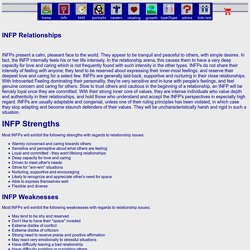
They appear to be tranquil and peaceful to others, with simple desires. In fact, the INFP internally feels his or her life intensely. In the relationship arena, this causes them to have a very deep capacity for love and caring which is not frequently found with such intensity in the other types. INFPs do not share their intensity of feeling with anyone; they tend to be reserved about expressing their inner-most feelings, and reserve their deepest love and caring for a select few.
INFPs are generally laid-back, supportive and nurturing in their close relationships. Most INFPs will exhibit the following strengths with regards to relationship issues: Most INFPs will exhibit the following weaknesses with regards to relationship issues: [INFP] Builder, Negotiator, Explorer and Director. INFP (Dreamer) Personality Type - Jungian.
S PersonalityZone - Personality and Your Relationships. Women and Romance Part 3: Idealist Women By Dr.

Lovegood Idealist women tend to be very romantic. They love to give and receive tokens of affection, such as an original poem, a hand carved box, or an item which reminds them of some shared experience. Men often appreciate their compassion and empathy along with their belief in others. When dating, they hope they'll get to know each other through deep conversation. Rachel is an Idealist Counselor (INFJ). Bethany is an Idealist Teacher (ENFJ).
Arianna is an Idealist Champion (ENFP). Isabel is an Idealist Healer (INFP). Portrait of the Idealist® Healer (INFP) Healers present a calm and serene face to the world, and can seem shy, even distant around others.

But inside they're anything but serene, having a capacity for personal caring rarely found in the other types. Healers care deeply about the inner life of a few special persons, or about a favorite cause in the world at large. And their great passion is to heal the conflicts that trouble individuals, or that divide groups, and thus to bring wholeness, or health, to themselves, their loved ones, and their community. Healers have a profound sense of idealism that comes from a strong personal sense of right and wrong. They conceive of the world as an ethical, honorable place, full of wondrous possibilities and potential goods.
Also, Healers might well feel a sense of separation because of their often misunderstood childhood. Catalyst (Idealist) Temperament. INFP - Harmonizer Clarifiers. The following is adapted from Linda V.
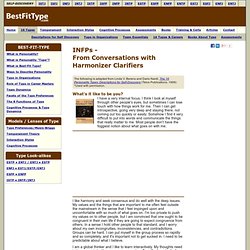
Berens and Dario Nardi, The 16 Personality Types: Descriptions for Self-Discovery (Telos Publications, 1999) *Used with permission. What's it like to be you? I have a very internal focus. I think I look at myself through other people's eyes, but sometimes I can lose touch with how things work for me. Then I can get introspective, going very deep and staying there, not coming out too quickly or easily.
I like harmony and seek consensus and do well with the deep issues. I am a global thinker and I like to learn interactively. For me, asking questions is just a different form of being quiet, a way to explore an inner thought stream or check out of reality and back into my thoughts. I'm concerned about how others feel when they are around me. I don't know what I am going to do next, but I trust in myself that something will come in as a new idea, with challenge and inner meaning. INFP personality. Mediator personalities are true idealists, always looking for the hint of good in even the worst of people and events, searching for ways to make things better.
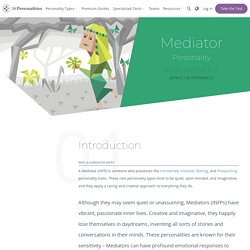
While they may be perceived as calm, reserved, or even shy, Mediators have an inner flame and passion that can truly shine. Comprising just 4% of the population, the risk of feeling misunderstood is unfortunately high for the Mediator personality type – but when they find like-minded people to spend their time with, the harmony they feel will be a fountain of joy and inspiration. Being a part of the Diplomat Role group, Mediators are guided by their principles, rather than by logic (Analysts), excitement (Explorers), or practicality (Sentinels).
The INFP Writing Personality: Elegant Persuasion. Everyone needs to be valued.
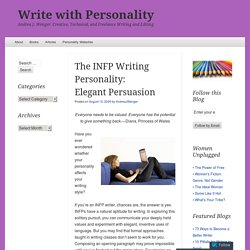
Everyone has the potential to give something back. —Diana, Princess of Wales Have you ever wondered whether your personality affects your writing style? If you’re an INFP writer, chances are, the answer is yes. INFPs have a natural aptitude for writing. The INFP personality type is one of 16 identified by the Myers-Briggs Type Indicator, a popular psychometric instrument used to determine how people prefer to gather information and make decisions.
I: Introversion preferred to extraversion INFPs get their energy from the internal world of thoughts and ideas. N: iNtuition preferred to sensation INFPs are abstract thinkers, placing more trust in flashes of insight than in experience. F: Feeling preferred to thinking INFPs prefer to use their rational feeling function when making decisions. INFP MBTI Personality Type Profile. Are you an INFP?
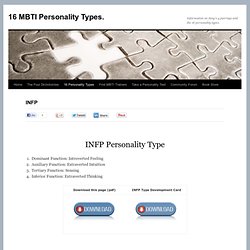
Can you support us in our research. It's only ten questions and your contribution will be much appreciated. As an INFP, your primary mode of living is focused internally, where you deal with things according to how you feel about them, or how they fit into your personal value system. Your secondary mode is external, where you take things in primarily via your intuition.
INFP. Centre for Confidence and Well-being, Resources, Diversity and Type, Type Resources (MBTI), INFP. INFPs are insightful and extremely perceptive types who care very passionately about their duties and the things they believe in.
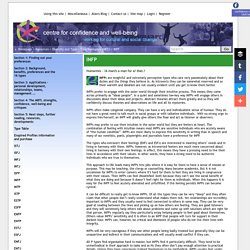
As introverts they can be somewhat reserved and so their warmth and idealism are not usually evident until you get to know them better. INFPs prefer to engage with the outer world through their intuitive process. This means they come across primarily as “ideas people”. In a quiet and sometimes low-key way INFPs will engage others in discussions about their ideas and projects. INFP Personal Growth. INFPs are creative, sensitive souls who take their lives very seriously.
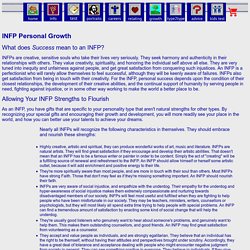
They seek harmony and authenticity in their relationships with others. They value creativity, spirituality, and honoring the individual self above all else. They are very tuned into inequity and unfairness against people, and get great satisfaction from conquering such injustices. An INFP is a perfectionist who will rarely allow themselves to feel successful, although they will be keenly aware of failures.
INFPs and Stress. INFPs feel internal turmoil when they find themselves in situations in which there is conflict between their inner code of ethics and their relationships with others. They feel caught between pleasing others and maintaining their own integrity. Their natural tendency to identify with others, compounded with their self-sacrificial dispositions, tends to leave them confused as to who they really are. Their quiet personalities further feeds their feelings of depersonalization. The INFP's quest for self-identity then seems even more alluring but increasingly impossible to attain.
INFP Personality Type Profile. Students.usask.ca/current/life/employment/PDFs/INFP.pdf. Idigitalcitizen.files.wordpress.com/2011/02/infp-profile-healer-idealist-pdf2.pdf. INFP.